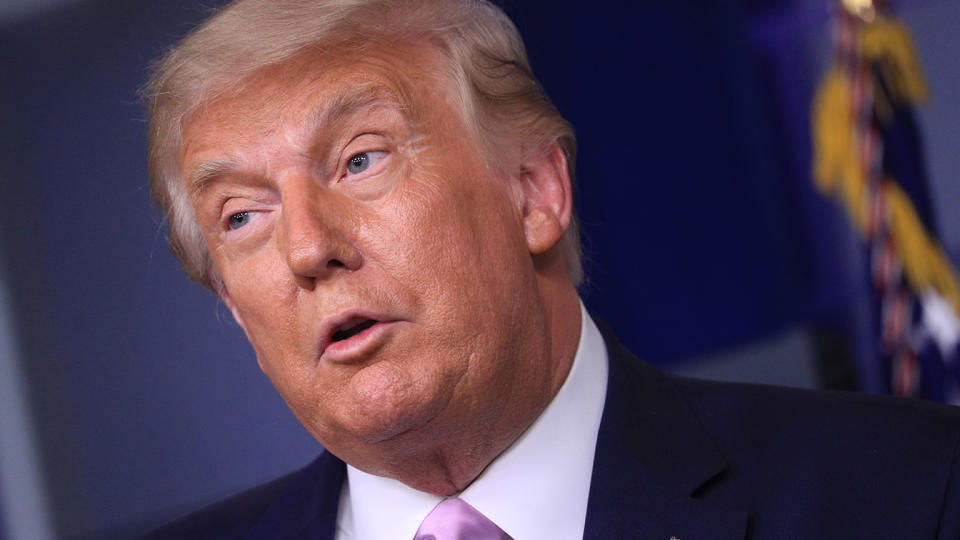Trump says he believes QAnon conspiracy theory supporters 'are people that love our country'
President Trump said Wednesday that he doesn’t know much about QAnon, a fringe conspiracy movement that was labeled a domestic terrorist threat by the FBI last year. But he claimed he has heard that its supporters love America.
During a briefing at the White House, Trump, when asked what he thought about QAnon, said he wasn’t familiar with it, other than that its members seem to support him. “Which I appreciate,” he said. “But I don’t know much about the movement.”
Despite not knowing much about them, though, Trump described QAnon supporters as people who are concerned about the state of the country. “These are people that don't like seeing what's going on in places like Portland and places like Chicago and New York and other cities and states. I’ve heard these are people that love our country,” he said.
Trump was then asked about the QAnon theory that he’s secretly saving the world from a satanic cult of pedophiles and cannibals.
“I haven’t heard that,” Trump said. “But is that supposed to be a bad thing or a good thing? If I can help save the world from problems, I’m willing to do it. And we are actually — we’re saving the world from a radical left philosophy that will destroy this country.”
A spokesperson for Biden’s campaign said Trump legitimized a conspiracy theory “that the FBI has identified as a domestic terrorism threat,” according to a statement issued to reporter Ben Jacobs.
“Our country needs leadership that will bring us together more than ever to form a more perfect union,” the statement said. “We have to win this battle for the soul of our nation.”
QAnon is a loose movement founded in 2017 on a rumor that President Trump is working to defeat an international conspiracy to kidnap, abuse, torture and kill children. It is a version of the delusion under which an armed North Carolina man attempted a rescue mission at a Washington pizzeria in 2016, the baseless Pizzagate conspiracy theory. Trump, in the QAnon worldview, is working behind the scenes to expose and disrupt this conspiracy but has been thwarted by “deep-state” bureaucrats and global elites.

Earlier this month, NBC News reported that QAnon groups on Facebook had millions of members and followers.
Trump’s remarks Wednesday came on the same day that Facebook announced it was cracking down on QAnon-related groups in an attempt to curb violent rhetoric. QAnon believers have been tied to kidnappings, murder and terrorism.
The narrative is fed by cryptic posts on internet message boards from the anonymous “Q,” whom followers believe to be a high-ranking intelligence official, or possibly even Trump himself. Popular YouTube and social media pages promulgate and analyze Q’s vague messages, turning the obsession into something of a game for many followers.
Last year, Yahoo News reported that an FBI document had identified QAnon as one of the “conspiracy theory-driven domestic extremists” that were potential terrorist threats.
“The FBI assesses these conspiracy theories very likely will emerge, spread, and evolve in the modern information marketplace, occasionally driving both groups and individual extremists to carry out criminal or violent acts,” the document states. It also goes on to say the FBI believes conspiracy-theory-driven extremists are likely to increase during the 2020 presidential election cycle.

Trump has been outspoken in his support for Marjorie Taylor Greene, a Republican House candidate in Georgia who has ties to QAnon and has made a number of racist and xenophobic statements. Earlier this month, Greene won a primary runoff and is likely to win the seat this fall, making her the first open believer in the conspiracy in Congress. In May, a candidate who repeatedly promoted the conspiracy won the Republican primary for the U.S. Senate in Oregon. Democrats are expected to retain that seat.
According to tracking by Media Matters, 20 candidates — 19 Republicans and an independent — with ties to QAnon have secured a spot on November ballots.
_____
Read more from Yahoo News:

 Yahoo Sports
Yahoo Sports 
